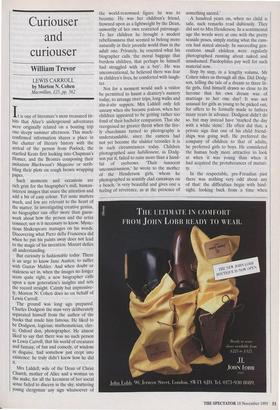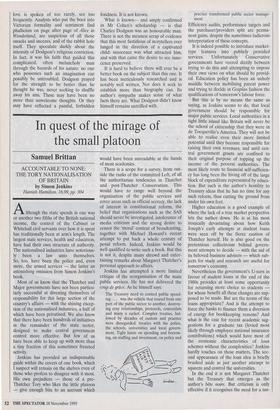Curiouser and curiouser
William Trevor
LEWIS CARROLL by Morton N. Cohen Macmillan, £25, pp. 562 It is one of literature's most treasured tit- bits that Alice's underground adventures were originally related on a boating trip one sleepy summer afternoon. This much- confirmed information shares a place in the chatter of literary history with the arrival of the person from Porlock, the startled Keats first looking into Chapman's Homer, and the Brontes composing their imitation Blackwood's Magazine or scrib- bling their plots on rough brown wrapping paper.
Such moments and occasions are rich grist for the biographer's mill, human- interest images that snare the attention and add a bit of easy colour. Yet none matters much, and few are relevant to the heart of the matter. In investigating creative genius, no biographer can offer more than guess- work about how the person and the artist connect; nor is it necessary to know. Myste- rious Shakespeare manages on his words. Discovering what Piero della Francesca did when he put his paints away does not lead to the magic of his invention. Mozart defies all understanding. But curiosity is fashionable today. There is an urge to know Jane Austen, to suffer with Gustav Mahler. And when doubt or staleness set in, when the images no longer seem quite right, a new biographer calls upon a new generation's insights and sets the record straight. Calmly but impressive- ly, Morton N. Cohen does so on behalf of Lewis Carroll.
The ground was long ago prepared. Charles Dodgson the man very deliberately separated himself from the author of the books that made him famous. He liked to be Dodgson, logician, mathematician, cler- ic, Oxford don, photographer. He almost liked to say that there was no such person as Lewis Carroll, that his world of creatures and fantasy, of fun and comedy, of wisdom mdisguise, had somehow just crept into existence: he truly didn't know how he did it.
Mrs Liddell, wife of the Dean of Christ Church, mother of Alice and a woman on the make, for all the keenness of her social sense failed to discern in the shy, stuttering Young clergyman any sign whatsoever of the world-renowned figure he was to become. He was her children's friend, frowned upon as a lightweight by the Dean, unworthy of her own restricted patronage. To her children he brought a modest rebelliousness that seemed to belong more naturally in their juvenile world than in the adult one. Privately, he resented what his biographer calls 'the moral baggage that burdens children, that perhaps he himself had struggled with as a boy'. He was unconventional, he believed there was fear in children's lives, he comforted with laugh- ter.
Not for a moment would such a visitor be permitted to haunt a deanery's nursery today, to arrange river trips, long walks and tete-a-tete suppers. Mrs Liddell only felt uneasy when she became jealous, when her children appeared to be getting rather too fond of their bachelor companion. That she recognised no greater threat when the live- ly churchman turned to photography is understandable, since the camera had not yet become the sinister recorder it is in such circumstances today. Children photographed sans habillement, as Dodg- son put it, failed to raise more than a hand- ful of eyebrows. 'Their innocent unconsciousness,' he wrote to the mother of the Henderson girls, whom he photographed as scantily clad castaways on a beach, 'is very beautiful and gives one a feeling of reverence, as at the presence of something sacred.'
A hundred years on, when no child is safe, such remarks read dubiously. They did not to Mrs Henderson. In a sentimental age the words were at one with the pretty seaside poses, simply stating what the cam- era had stated already. In succeeding gen- erations small children were regularly photographed running about naked and unashamed. Paedophiles pay well for such material now.
Step by step, in a lengthy volume, Mr Cohen takes us through all this. Did Dodg- son, telling the tale of a dream to three lit- tle girls, find himself drawn so close to its heroine that his own dream was of marriage to her one day? It was not unusual for girls as young to be picked out, for offers to be formally made to fathers many years in advance. Dodgson didn't do so, but may instead have 'marked the day with a white stone'. He often did that, a private sign that one of his child friend- ships was going well. He preferred the company of children to that of adults, he preferred girls to boys. He considered the human body more attractive to look at when it was young than when it had acquired the protuberances of maturi- ty.
In the respectable, pre-Freudian past there was nothing very odd about any of that: the difficulties begin with hind- sight, looking back from a time when love is spoken of too rarely, sex too frequently. Analysts who put the boot into Victorian formality and sentiment find phallicism on page after page of Alice in Wonderland, are suspicious of all those smacks and sneezes, and of the rabbit hole itself. They speculate darkly about the intensity of Dodgson's religious conviction. In fact, it was his faith that guided this complicated, often melancholy man through the hazards of his nature: no one who possesses such an imagination can possibly be untroubled. Dodgson prayed for the strength to be better than he thought he was, never seeking to shuffle away his sins. These may have been no more than unwelcome thoughts. Or they may have reflected a painful, forbidden fondness. It is not known.
What is known— and amply confirmed in Mr Cohen's scholarship — is that Charles Dodgson was an honourable man. There is not the meanest scrap of evidence that this most fastidious of storytellers ever lunged in the direction of a captivated child: innocence was what attracted him, and with that came the desire to see inno- cence preserved.
It is hard to believe there will ever be a better book on the subject than this one. It has been meticulously researched and is notably well written. Nor does it seek to establish more than biography can. Its author's sympathy makes sense of what facts there are. What Dodgson didn't know himself remains untrifled with.



















































































 Previous page
Previous page